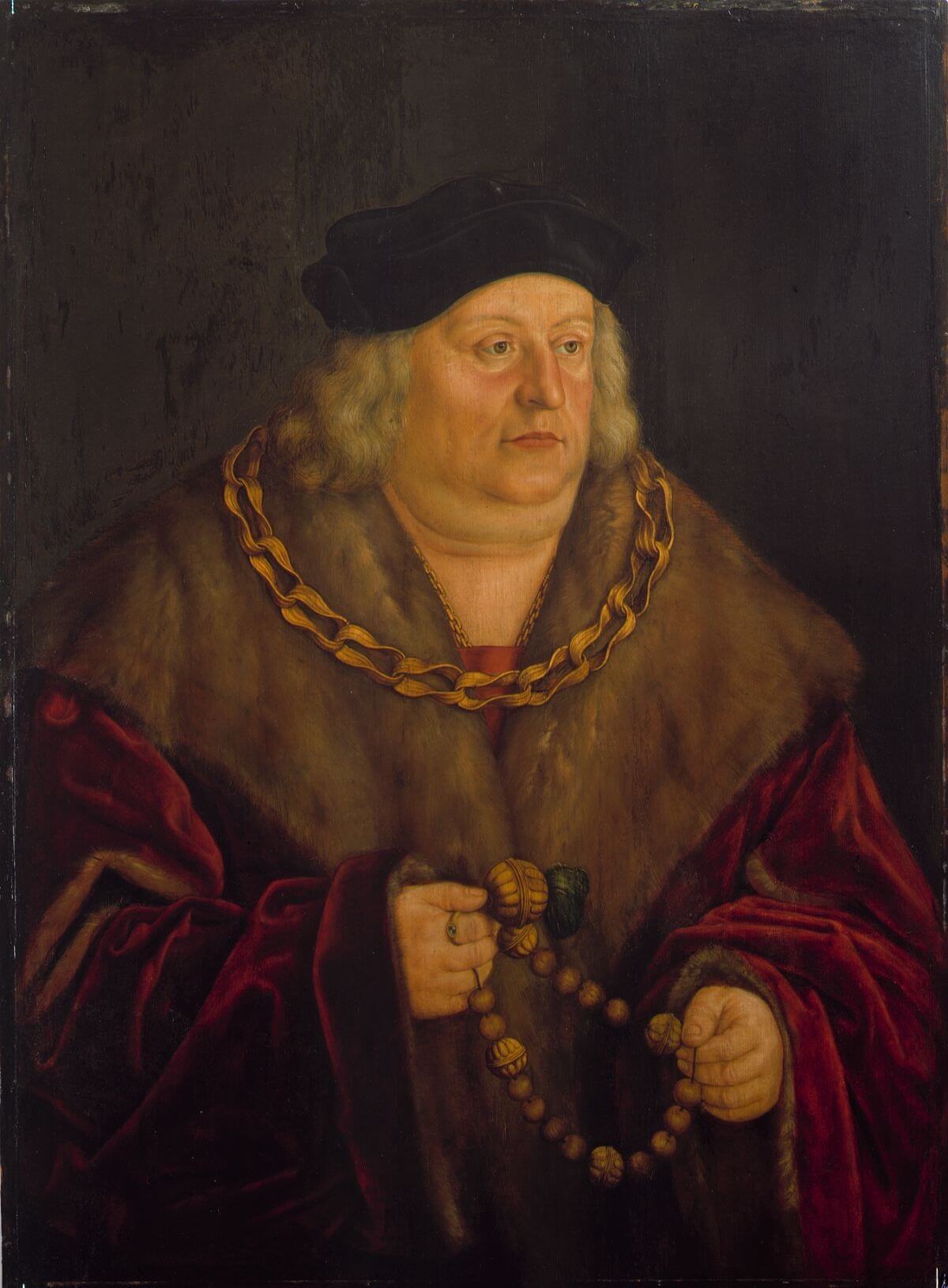The Origin of the Bavarian Beer Purity Law
Künker’s upcoming auction 335 on 18 and 19 March 2020 features a comprehensive collection of Bavarian coins and medals. We seize the opportunity to introduce you to the duke at the origin of the Bavarian “Reinheitsgebot” – the beer purity law. William IV and his brother Louis X regulated the ingredients of a proper beer in the Bavarian order of 1516. However, back then, beer was least of their worries…
Primogeniture
Albert IV, the father of William and Louis, had been the fifth-oldest son of seven male descendants. Nevertheless, he asserted himself as sole ruler of Bavaria, even if it cost him money, energy and numerous concessions. Under his reign, the Duchy of Bavaria enlarged its territory significantly, which provided him with the necessary resources to play a political role at a European level. However, Albert knew that this development would come to an end once he died: he had three sons among whom he would have to distribute the inheritance. And reducing the size of the territories was tantamount to reducing their power.
That was probably the reason why Albert broke with the traditional medieval line of succession. Instead of distributing his estates among his sons, he decreed that from then on the principle of primogeniture should be applied in the Duchy of Bavaria. In other words, the eldest son was to inherit the rule. All younger princes were to be appointed counts by the oldest son and fobbed off with an appanage of 4,000 guldens per year.
This regulation was adopted just in time. Albert IV, who was already referred to as “the Wise” by his contemporaries, died one year later.
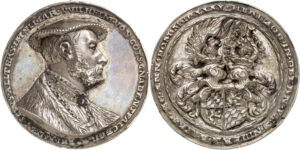
Silver cast medal 1535, unsigned, by Matthes Gebel commemorating William IV. Very rare. Probably original cast. From the Gutekunst Collection, Jacob Hirsch auction 28 (1910), No. 227. Estimate: 1,000 euros. From Künker auction 335 (2020), No. 3375.
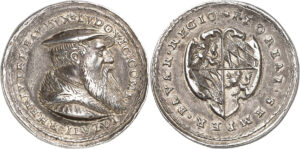
Silver medal n.d. by the “master of the group of duke Louis” commemorating Louis X. Very rare. Original strike. Very fine to extremely fine. Estimate: 1,000 euros. From Künker auction 335 (2020), No. 3381.
The Eldest Son Inherits, the Second-Eldest Son Protests and, in the End, Everybody Has His Own Reign Once Again
Albert’s eldest son was called William IV and was only 15 years old when his father died. Only in 1511 he was completely released from the guardianship. Two years later, his brother Louis came of age and was anything but thrilled about his brother becoming the duchy’s sole ruler. He protested. He argued that he had been born before his father’s inheritance decree was adopted and, thus, it did not apply to him.
The situation almost escalated into an armed conflict between both brothers. To prevent that from happening, Emperor Maximilian II offered to issue an arbitration award. Nobody in Bavaria wanted him to do that because they had already had bad experiences with the emperor’s arbitration awards in the past. Maximilian had put an end to the War of the Succession of Landshut with an arbitration award and, as his fee, he had taken rather large and rich Bavarian territories. Thus, the brothers preferred to come to an immediate agreement rather than to risk another imperial arbitration award. That was much cheaper. On 14 October 1514, it was decreed that William was to control two thirds of the state in Munich, while Louis was given the rich districts of Landshut and Straubing.
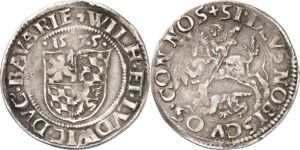
William IV and Louis X, joint minting 1516–1545. 10 kreuzers (1/4 taler) 1525, Munich. Very rare. Very fine. Estimate: 2,500 euros. From Künker auction 335 (2020), No. 3378.
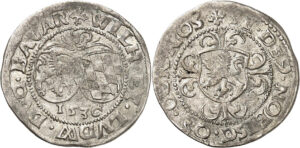
William IV and Louis X, joint minting 1516–1545. 6 kreuzers 1536, Munich. Very rare. Very fine. Estimate: 500 euros. From Künker auction 335 (2020), No. 3380.
Uniform Regulations for the Whole of Bavaria – and the “Reinheitsgebot” as a Bonus
Despite the territorial division, the two brothers were committed not to let Bavaria fall apart once again. Quite the opposite. Therefore, for example, they issued jointly minted coins featuring the names of William and Louis. Regarding motif and weight, these coins were produced according to the monetary regulation of 1506, which their father Albert IV had had approved by the estates at the same time as the (failed) introduction of primogeniture.
In general, both rulers were eager to put a unifying bracket over both parts of the country. One means in order to do so was the Bavarian order, which was adopted in April 1516 with the consent of the united territorial estates of Lower and Upper Bavaria. This order regulated numerous practical matters. But there’s one thing that made it famous: for the very first time, the regulation defined for the whole of Bavaria what a decent beer consisted of, namely barley, hops and water – and nothing else.
William IV would probably be quite surprised if he knew that he went down in history mainly for this order. For him, beer was only one of many issues that had to be regulated. Regarding this matter, he agreed with his brother on the fact that the regulation that his father had adopted for Munich and extended to the whole of Upper Bavaria would, from then on, apply to the entire Duchy of Bavaria. Such food regulations were nothing unusual in the late Middle Ages and in early modern times. On the contrary. What makes the Bavarian beer purity law special is the fact that it has never been abolished.
For William IV and Louis X it was just a tiny article of their order; and their order was just a tiny step on the way to a unified duchy: in 1518 they published a reformed version of the order for the whole of Bavaria, and the first uniform judicial constitution followed in 1520.
Renaissance Dukes – Renaissance Buildings
The two brothers did not only work together regarding domestic politics. They also cooperated when it came to limiting the power of their neighbours, the Habsburgs. Louis ran against Ferdinand I for the office as King of Bohemia and of the Romans. Even though he failed, it shows how rich and powerful the two Bavarian dukes were.
Today, the residences in Landshut and Munich still bear witness to the two brothers’ artistic sensibility and to the quality of the artists they employed at their courts.
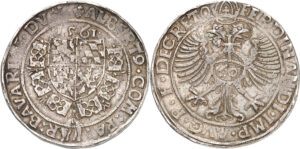
Albert V gulden taler (60 kreuzers) 1561, Munich. Extremely rare. Very fine. From Künker auction 335 (2020), No. 3382.
Bavaria United Under Albert V
Louis X died in 1545 without having an heir. And William IV had only one surviving son, Albert V. When he took over the rule, what Albert IV had initiated finally came true: now, Bavaria became a real primogeniture where no younger brother could object to that system – simply because there was no younger brother.
And when Albert V died in 1579, his sons had already gotten used to the idea that only the eldest son was to become their father’s successor. Therefore, William V became the sole Duke of Bavaria. Ferdinand, the second-eldest son became count and founded the family of the Counts of Wartenberg. And the youngest brother adopted an ecclesiastical career. Since then, Bavaria has never been divided again. Perhaps that’s one of the reasons why its inhabitants have developed such a strong love for their homeland.
Here you’ll find a comprehensive auction preview of the Künker Spring Auction.
On the Künker website you may browse through the online auction catalogue.







